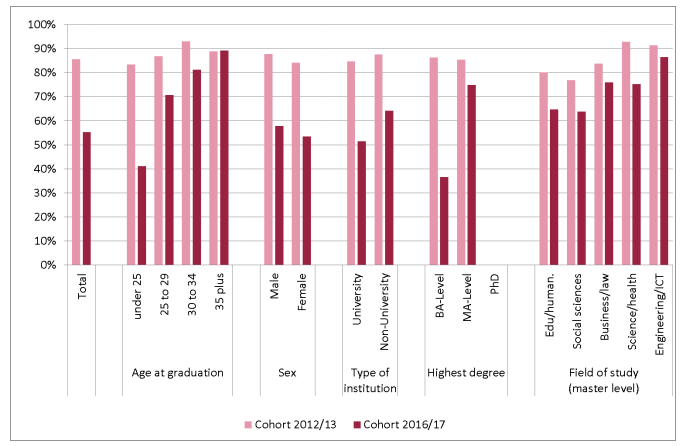The Agency for Science and Higher Education, in cooperation with the Faculty of Law at the University of Zagreb, conducted research on the employment rate of graduate students on a national level during 2018.
The research was conducted within the project EUROGRADUATE financed by the EU funds. Along with the Republic of Croatia, seven European countries participated in the project: Austria, Czech Republic, Germany, Greece, Lithuania, Malta, and Norway.
The survey covered generations of graduate students who finished their studies in academic years 2012/2013 and 2016/2017, that is one and five years after graduation.
The goal of this project was the collecting of information on students’ experience and transfer into the world of employment and comparison of conditions of studying and living conditions of graduate students in various European countries.
Research results have been published in studies:
Summary
- 7 European countries, along with Croatia, participated in research and those are Austria, Czech Republic, Germany, Greece, Lithuania, Malta and Norway
- 21 000 graduate students from 8 countries had access to online questionnaire
- The percentage of filled in questionnaires (response rate) for each cohort:
- one year after graduation – those who graduated in the academic year 2016-2017 – 8,8%
- five years after graduation – those who graduated in the academic year 2012-2013. – 18,7%
- 58% participants finished their undergraduate studies ISCED 6
- 62% participants finished their graduate studies ISCED 7 (integrated studies included)
- The percentage of participants who finished university and professional study program:
- university studies were finished by:
- in 2012/2013 cohort – 69% participants
- in 2016/2017 – 70% participants
- professional studies were finished by:
- in 2012/2013 cohort – 31% participants
- in 2016/2017 cohort – 30% participants
- university studies were finished by:
- The percentage of those employed one year after graduation (2012/2013 cohort):
- bachelors 86,3%; with master’s degree 85,4%
- The percentage of those employed 5 years after graduation (2016/2017 cohort):
- bachelors 36,6%; with master’s degree 74,8%
- Croatia has the lowest employment rate (behind Greece) and a high unemployment rate of bachelors for both cohorts. Over 50% of graduate students of undergraduate studies continue with their studies and therefore they are not part of the workforce (regular students, military or other mandatory services, unable to work for health reasons)
- Croatia has the lowest employment rate (behind Greece) and the higher unemployment rate of masters in both cohorts.

The percentage of graduate students in 2018, one and five years after graduation (both cohorts), according to age in the time of graduation, gender, type of educational institution, highest education degree, and the beginning of studies
- The conducted research in eight countries shows that the unemployment rate among the young people was:
- the highest in Greece (39,9%) and Croatia (23,8%)
- the lowest in Germany (6,2%)
- 5 years after graduation, 4 out of 5 graduate students in each country has a contract for indefinite period – more men than women have the contract for indefinite period
- Highest salaries are in the field of technology and engineering, and the lowest ones are in the field of education, art and humanities
- Out of all participants, 13% experienced studying abroad, mostly through EU mobility programs. The lowest participation in mobility was among participants from Greece and Croatia
- Graduate students employed in another country from the one where they graduated earn approximately 30 percent more than those who stayed in the country, even on lower-ranking jobs
- Greek graduates stand out in particular, earning the average of 2000 Euros more than those who stay in Greece
- Norwegian graduates have the opposite situation since those abroad earn approximately 2000 Euros less than those in Norway

